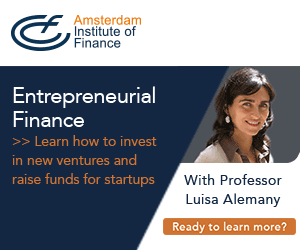“Start-ups play a key role in the economy, generating disruptive innovations and creating employment”, says Professor Luisa Alemany (London Business School) who will be leading a program on Entrepreneurial Finance at Amsterdam Institute of Finance in March. Main advantages of investing in start-ups are their great potential for growth, profits and that there is relatively little funding needed to gain significant control. However, to survive and thrive this funding is highly essential for start-ups. Getting money from traditional banks is very challenging. “These start-ups have no assets or factories – they have ideas and patents.” Luisa Alemany explains. Fortunately, there’s a thriving venture capital market looking for opportunities to invest.
Understanding the entrepreneurial finance market is crucial for anyone working in venture capital, corporate innovation, or a government organization supporting entrepreneurs. Predominantly, because forecasting the future of a start-up is different from forecasting other companies. Traditionally, lenders make a forecast based on its history to value a company. But, to forecast the future of a company that is six months or a year old and that could be disrupting a market or even create new market, you cannot apply traditional methods. There is a separate model entirely.
Professor Luisa Alemany will be leading a program on Entrepreneurial Finance at the Amsterdam Institute of Finance in March. The two-day course is relevant for investors, but also applicable to entrepreneurs looking for early stage funding.
Aside from her successful academic career, and teaching around the world, Luisa has experience in investment banking and private equity, and is an angel investor herself. She served on the Board of EBAN, and is involved in Rising Tide Europe, the first European women-only business angels fund. Next to this, she is also the co-author of the first European textbook on the topic: “Entrepreneurial Finance: The Art and Science of Growing Ventures” (Cambridge University Press, 2018).
Nowadays, there’s a thriving venture capital market looking for opportunities to invest. “Venture capitalists look for companies that are growing fast and need a lot of money to scale up.” Because a lot of new tech companies are starting up daily, this is in general the preferred area. “Most innovation comes from these new companies. They are disrupting every single market. They play a key role in economic growth,” says Luisa. “Therefore, from the investors’ point of view, there is an opportunity to get high returns by investing early.”
The other option for finance is “angel investors”, private individuals who invest their own money. According to EBAN (European Business Angels Network), they were responsible for €6 billion invested across Europe in 2015, and with a growth rate of 8.3 percent annually since 2012. “This is a very significant source and is growing. Some research has estimated that angel investors are responsible for about three times the money that comes from early-stage venture capital. They often play a role beyond the money, mentoring and helping the entrepreneur with their knowledge.”
However, whether as an entrepreneur, a person working in VC or the innovation arms of corporations, or someone in a government-related organization involved in supporting entrepreneurs, understanding the dynamics of this market is crucial for success. “This world of tech startups is so specific and unique. It’s not like investing in a restaurant or a shop. It’s high growth, with a lot of pressure and it can be very profitable but if you want to be involved in that world you really need to get ready and prepare yourself.”
“This world of tech startups is so specific and unique. It’s not like investing in a restaurant or a shop.”
Professor Luisa Alemany
Between the angels, the venture capitalists, corporate venture capital, accelerators and crowdfunding platforms there’s plenty of money around for early stage investment, according to Luisa. “The entrepreneurs need to know how to approach investors and how to negotiate with them, how to identify whether the conditions make sense or not,” she says. That’s what the Entrepreneurial Finance program seeks to impart.
To value a company, lenders need to forecast the future, based on its history. “To forecast the future of a company that is six months or a year old, that is technological, and that could be disrupting a market or even creating new markets, is very challenging,” says Alemany. “You cannot apply traditional methods. There is a separate model entirely, the VC model. Everyone thinks that they know how the VC model works, but the valuation of new businesses is not covered adequately in traditional finance books, and this is one of the areas addressed in depth in the course. Participants practice with different examples and cases. The focus is to learn by doing.”
Attention is paid to the term sheet. “This is a legal contract between the entrepreneur and the investor. People may not realize how critical it is, until something goes wrong,” says Luisa. “It’s also important to think about how you will exit and make a profit, even if that is some years away.”
